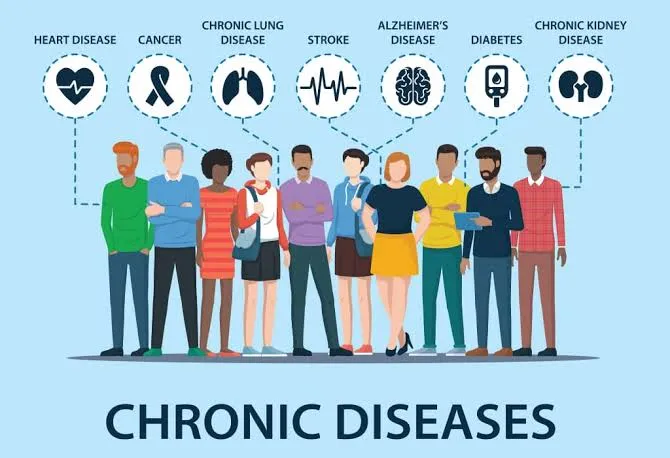Hi everyone, I am happy to be a part of Spoonies Unite community, I hope. I am welcomed here, as this community is Mainly focused on Chronic Illness, I would like to write about some of chronic illnesses so that anyone can check this post to get more information.

Chronic illness is a long-term health condition that requires ongoing management and treatment. It can significantly impact a person's quality of life and often requires a multidisciplinary approach to address both the physical and emotional aspects of the illness. While there is no cure for most chronic illnesses, there are various treatment options available to help manage symptoms, slow down disease progression, and improve overall well-being. In this article, we will explore some common chronic illnesses and the different ways they can be treated.
Diabetes: Diabetes is a chronic illness characterized by high blood sugar levels. Treatment typically involves lifestyle changes such as adopting a healthy diet, regular exercise, and weight management. Additionally, many people with diabetes require medication, such as insulin or oral medications, to help regulate blood sugar levels.
Asthma: Asthma is a chronic respiratory condition that causes inflammation and narrowing of the airways, leading to difficulty breathing. Treatment often involves the use of inhalers to control symptoms and prevent asthma attacks. In severe cases, oral medications or injections may be prescribed. Avoiding triggers, such as allergens or irritants, is also an important part of managing asthma.
Arthritis: Arthritis refers to inflammation of the joints and can cause pain, stiffness, and reduced mobility. Treatment options for arthritis include medication to reduce inflammation and manage pain, physical therapy to improve joint function and strength, and assistive devices such as braces or splints. Lifestyle modifications, such as maintaining a healthy weight and engaging in low-impact exercises, can also help manage symptoms.
Depression: Depression is a mental health condition characterized by persistent feelings of sadness, loss of interest or pleasure in activities, and changes in sleep and appetite. Treatment for depression often involves a combination of therapy, such as cognitive-behavioral therapy (CBT), and medication, such as antidepressants. Lifestyle changes, including regular exercise, adequate sleep, and a supportive social network, can also play a role in managing depression.
Hypertension: Hypertension, or high blood pressure, is a chronic condition that can increase the risk of heart disease and stroke. Treatment typically involves lifestyle modifications, such as adopting a low-sodium diet, regular exercise, and stress management techniques. Medications may also be prescribed to help lower blood pressure.
Chronic pain: Chronic pain refers to persistent pain that lasts for more than three months. Treatment for chronic pain often involves a multidisciplinary approach, including medication (such as analgesics or anti-inflammatory drugs), physical therapy, psychological therapy (such as cognitive-behavioral therapy or relaxation techniques), and complementary therapies (such as acupuncture or massage). The goal of treatment is to manage pain and improve daily functioning.
HIV/AIDS: HIV (human immunodeficiency virus) is a chronic viral infection that attacks the immune system, leading to acquired immunodeficiency syndrome (AIDS). Treatment for HIV/AIDS involves antiretroviral therapy (ART), which helps suppress the virus and prevent disease progression. Regular medical monitoring and adherence to medication regimens are crucial in managing HIV/AIDS.
Multiple sclerosis: Multiple sclerosis (MS) is a chronic autoimmune disease that affects the central nervous system. Treatment for MS aims to manage symptoms, slow down disease progression, and improve quality of life. This may involve medication to reduce inflammation and modify the immune response, physical therapy to improve mobility and strength, and lifestyle modifications such as stress management and a healthy diet.
Chronic kidney disease: Chronic kidney disease (CKD) is a progressive condition that affects the kidneys' ability to filter waste from the blood. Treatment for CKD may include medication to control blood pressure and manage underlying conditions, dietary changes to reduce the workload on the kidneys, and in severe cases, dialysis or kidney transplantation.
Chronic obstructive pulmonary disease: Chronic obstructive pulmonary disease (COPD) is a progressive lung disease characterized by airflow limitation. Treatment for COPD often involves medication to manage symptoms and reduce inflammation, pulmonary rehabilitation to improve lung function and quality of life, and lifestyle changes such as quitting smoking and avoiding exposure to pollutants.
In conclusion, chronic illnesses require ongoing management and treatment to control symptoms, slow down disease progression, and improve overall well-being. Treatment options may vary depending on the specific illness but often involve a combination of medication, lifestyle modifications, therapy, and support from healthcare professionals. It is important for individuals with chronic illnesses to work closely with their healthcare team to develop a personalized treatment plan that addresses their unique needs and goals.